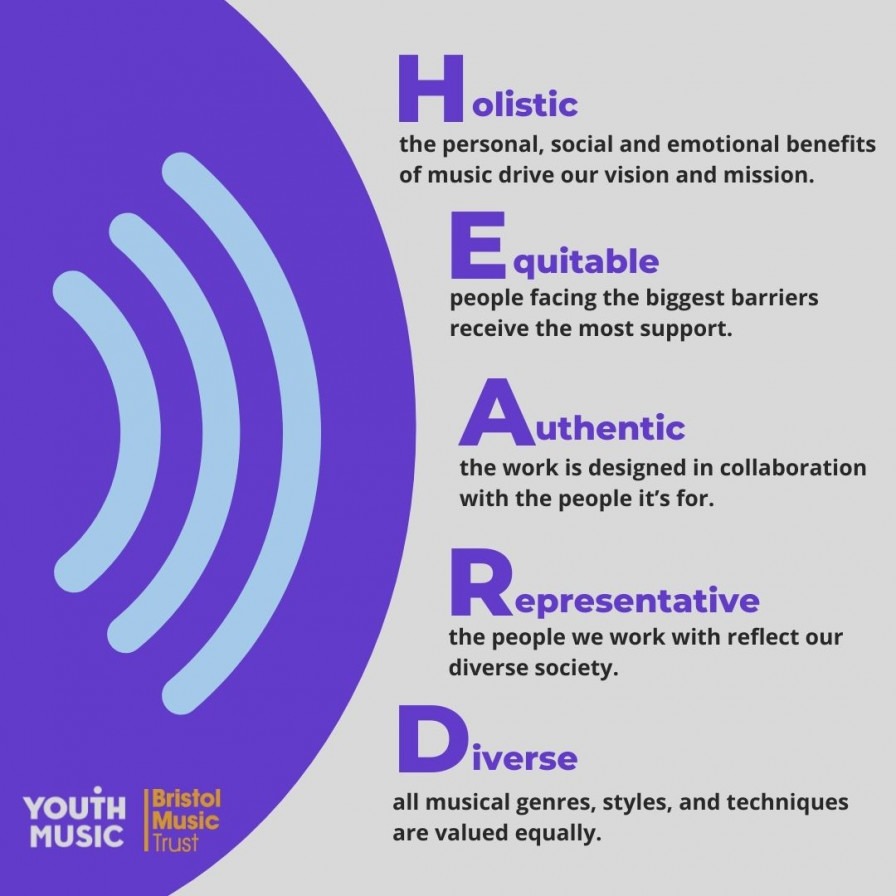Building equality, diversity and inclusion in our funding practices

Having equality, diversity and inclusion (EDI) as a strategic priority makes moral, financial and creative sense. Specific equality, diversity and inclusion goals are core to Youth Music’s business plan and a focus for the current period is about how we can use our expertise and nationwide reach to catalyse change beyond our own organisation.
Why?
Our first equality, diversity and inclusion action plan in 2016 set concrete goals that have helped us to diversify our board and staff, promote an inclusive working culture, and embed youth voice across our work.
Whilst we’re proud of the progress we’ve made, we’re also concerned that the pace of change is not keeping up with a society that is rapidly evolving. We need to continue to develop and challenge ourselves. Ultimately, we know that our impact will be greater if our work is designed and delivered by the people we serve.
We’ve always funded projects that have equality, diversity and inclusion at their heart.
Increasingly, we’re looking at the EDI practices of organisations themselves, beyond the projects they deliver
For several years, Fund C organisations have written and reported against equality, diversity and inclusion action plans. Recently we started asking Fund B applicants about their organisation’s EDI policies in application and reporting forms. We also collect diversity information from anyone that applies to us for a grant. For organisations, this means whether they are diverse-led.
Inclusion is more than a project
Alongside investment in projects for young people facing barriers, we design programmes to make music education more inclusive. We’ve learned from evaluating these programmes that equality, diversity and inclusion (EDI) can’t be tackled by an inclusive project - change has got to happen at organisational level too. Having a workforce that’s representative of our diverse society is important for young people to see themselves reflected in your offer. But organisations often need to have an open and inclusive culture before they can attract and retain a skilled diverse workforce.
Many organisations big or small struggle to put EDI at the centre of their work. This isn’t because of lack of will or care. We know that businesses are struggling in the aftermath of the pandemic, and with pressures to keep afloat EDI policies can easily be deprioritised.
I want to improve our EDI – where do I start and what support is on offer?
We have created an EDI self-assessment tool to help you get started assessing your current practices. We are pleased to see that many organisations have already engaged with the tool and reflected honestly on where they are organisationally. For those not already familiar, we would recommend using the tool as the first step to help you audit your existing work and policy.
After using the tool we would recommend you create some priorities and goals for the next couple of years. These priorities should be realistic. The goals should be measurable. Make sure you factor in time to undertake the activities that will help you achieve these goals. You also need to build in time to measure and evaluate how things are progressing. If you’re writing EDI goals for the first time, then your priorities in the first year might be about improving your data collection so you can benchmark and track progress. We’ve written an article about how we use data to track workforce diversity.
EDI isn’t limited to workforce and the board. It can also be applied within the context of your work with children and young people, your community and the sector. We want you to think about ways of embedding youth voice within your policy.
We’ll ask you about EDI as part of your grant reporting, and expect to see progress over the course of your grant.
Youth Music funding can be used to support organisations to improve their EDI practices
Our outcomes framework includes outcomes for organisations and the workforce, and improving equity, diversity and inclusion is an outcome we’d be happy to support.
If you’re at the beginning or part-way through your grant and would like to include some EDI activity, you can ask to re-allocate some budget towards this – just get in touch with your Grants and Learning Officer to discuss.
What if I still have questions?
When in doubt please don’t hesitate to get in touch with Youth Music’s Grants and Learning Team. Jana Jammal is the team lead for EDI. We are here to support you through this journey and are happy to provide advice.
Other useful resources
Article: how music businesses can drive change around EDI
Article: National Inclusion Week 2021: Youth Music CEO Matt Griffiths on looking beyond diversity data
Framework: the HEARD model of inclusive music education provides a simple lens through which you can think about EDI
Videos: More Music and Brighter Sound have produced a series of thought-provoking videos linked to the HEARD framework, which can be used in training or to stimulate discussion.
Learning Exchange: Exchanging Notes is Youth Music’s learning programme designed to share knowledge and build new connection. The ‘Empower Hour’ strand of Exchanging Notes is designed to showcase the diverse people and approaches within the Youth Music community.
Sign up to the Youth Music Network newsletter to stay up to date on all upcoming events.

